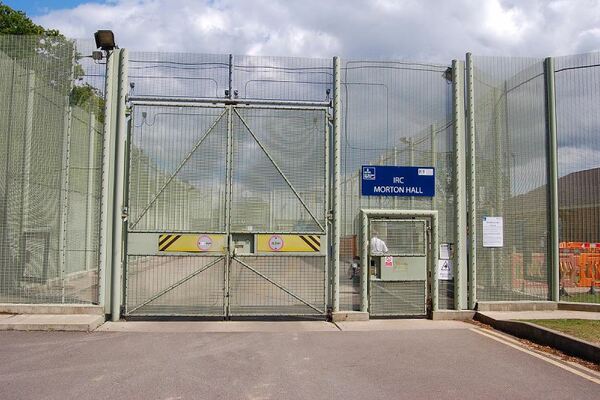One of BID's volunteers, Laurie Green-Eames, writes:
Morton Hall Immigration Removal Centre (IRC) was a prison until 2011. This recent past is obvious when you arrive, in our case in a taxi from Newark Northgate station. Concrete posts that jut into the sky are tethered by the neat coils of razor wire that sit atop chain-link fences. Heavy duty gates with video screens and buzzers are opened and shut as you move between the outside world and the various internal sections of the IRC.
Concrete posts that jut into the sky are tethered by the neat coils of razor wire that sit atop chain-link fences
We were there for an afternoon drop-in session for the immigration detainees at Morton Hall, to provide advice for those seeking bail. The people at the IRCs across the UK are held for an open-ended period of time, sometimes for years, before release or removal from the UK. At Morton Hall they live in one of several blocks of accommodation that appear to be gated-off from the facilities of the welfare block, only open at certain times of the day. In this block, which also houses the library and fax machine, we were allocated a fairly large room with a few chairs and tables and an electric space heater. Even in spring it gets very cold at Morton Hall.
The fax machine with which BID sends and receives communications becomes more important in Morton Hall, because mobile phone reception is so bad. It has apparently improved a little in recent times, but many of the detainees we spoke to independently complained that they struggled to get phone signal in large parts of the centre. As a result, they will often be unable to make or receive calls to or from BID, and therefore rely more on the machine and these in-person visits. Presumably this issue also applies to calls with their families and any legal representation they might have.
Detainees in all the IRCs in the UK face struggles with mental health, including depression and anxiety. The reduced contact with the outside world available at Morton Hall must contribute, especially when combined with the indeterminate nature of their detention and unavailability of legal aid for certain immigration cases. These are often vulnerable people too. Many callers to BID are victims of torture, and have ‘Rule 35’ reports (prepared by medical practitioners within the IRCs) to prove this. The Home Office must respond to these reports and state whether they will maintain the person’s detention or not. In 85% of cases audited, they find that detention must be maintained (opens PDF).
As a Volunteer Caseworker at BID, I have spoken to many people who have stated that they suffer from depression related to their detention, and Home Office figures show that 393 detained immigrants attempted suicide in 2015.
As a Volunteer Caseworker at BID, I have spoken to many people who have stated that they suffer from depression related to their detention
In the course of the 2.5 hour session, we met with just over 10 detainees. Some had quick queries about their bail application, while others had been BID clients for some time and were familiar with the process. Others were new clients who had recently been detained and were bewildered by their situation. One was an asylum seeker just a few days older than me, and I reflected on the privilege that I had grown up with.
Some of the men were frustrated and indignant, some angry. One man cried while talking about his children.
Ultimately some of the people we met will be removed from the UK, while others will be allowed to remain. Some will gain bail. None should be detained.
Are you interested in becoming a volunteer caseworker at BID? Find out more and apply here.





